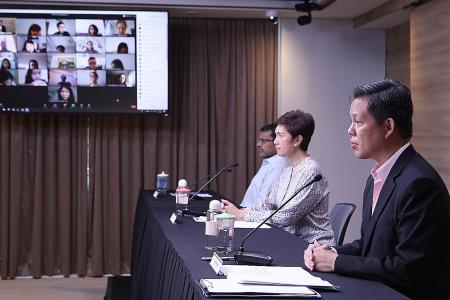Singapore not returning to pre-Covid world: Chan Chun Sing
Trade and Industry Minister describes new path for Singapore after economy sees deepest slump
Singapore will not return to a pre-Covid-19 world, and must chart a new path by building a new economy now, said Trade and Industry Minister Chan Chun Sing.
At a press conference yesterday where it was announced that Singapore's economy contracted 6.7 per cent in the first half of this year and is expected to shrink by between 5 per cent and 7 per cent this year, he said the "painful truth" is that the country will not return to a pre-Covid-19 world.
The circuit breaker measures exacted a steep toll in the second quarter, as the economy shrank 13.2 per cent from a year earlier.
It was Singapore's deepest economic slump on record, prompting the Government to not only trim its growth outlook for the year but also warn of more job losses.
"Some are still hoping for a quick recovery, and a return to the familiarity of the old normal. The painful truth is this - we are not returning to a pre-Covid world, recovery will be some time yet and is not likely to be smooth," Mr Chan said.
He also cautioned that the current crisis is unlike the 1998 Asian financial crisis or 2009 global financial crisis where "if we hunker down, things will improve in a few months".
"If we wait it out, we will likely be in worse shape than we are now," he said, adding the Republic must start now to build a new economy and create more job opportunities for people.
"We cannot wait for Covid-19 to blow over."
WORLD HAS CHANGED
There are four ways in which the world has changed irrevocably, said Mr Chan.
First, the geopolitical environment that allowed Singapore to thrive in the last 50 years has changed. Competition and tension between the major powers now permeate not just politics but also trade, technology and security.
"We must avoid being caught between the conflicts of the major powers, or be stranded in a fragmenting world of trade relations and technological standards," he said.
Second, global companies are re-organising their production and supply chains. Many are shifting from a focus on efficiency or "just in time" to resilience or "just in case".
Mr Chan said that for some manufacturers, this means a "China plus one" strategy with an active focus on Asean.
This means that while some new investments may come Singapore's way, existing ones may also move to other countries.
"If we do not adapt quickly, we will be bypassed," cautioned Mr Chan, pointing out that the country must enhance its critical advantages, such as intellectual property protection and legal certainty.
Third, he said, jobs have changed, and remote work means those in other countries can do Singaporeans' jobs from their homes.
Fourth, the shrinking economic pie will produce more social friction - between those who have more and those with less; and between foreigners and locals, or even between citizens and permanent residents.
Mr Chan urged Singaporeans not to isolate themselves from the world.
"Without the world as our hinterland and market, we will reduce Singapore's economic manoeuvring space, and limit rather than expand opportunities for our people," he said.
THREE PRINCIPLES
Singapore must hold on to three principles as it charts this new path, he said.
First, it will be open for business in a safe and sustainable way. It will isolate impacted Covid-19 clusters quickly and tightly and learn from the experience of others.
"Above all, if we each exercise social responsibility, we can permit more activities with less risk," he said.
Second, the Government will help businesses and workers adjust to the new world.
Companies with good opportunities in areas such as biopharma, supply chains and precision engineering will be given a boost. There will be a conducive and attractive environment for new businesses to start up and plant their investments here for the long term, Mr Chan said.
Industries that are permanently changed - such as tourism and entertainment - will get help to reinvent themselves, and pivot into new markets and products, he said.
Third, the Government will establish "the right macro conditions", including strengthening Singapore's links to the global markets for supplies, technology and talent.
The Republic's aviation and port hub status can never be taken for granted, and more will be revealed on this in the coming weeks, Mr Chan said.
He added that the digital free trade agreements that Singapore has inked will open more markets for its businesses, while preserving existing access to conventional markets.
The Government will also train Singaporeans for the jobs of tomorrow and strengthen job matching efforts.
He promised that despite the challenges, the Government's commitment to every Singaporean remains the same.
"We will do our utmost to prepare our people for the challenges ahead, for us not only to survive but to thrive in the new environment," he said.
Get The New Paper on your phone with the free TNP app. Download from the Apple App Store or Google Play Store now



